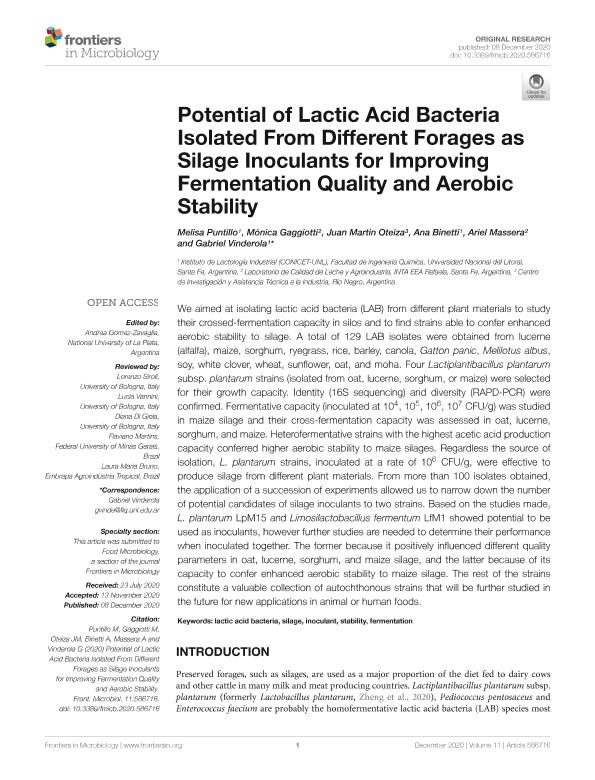Mostrar el registro sencillo del ítem
dc.contributor.author
Puntillo, Melisa Anahí

dc.contributor.author
Gaggiotti, Mónica del Carmen

dc.contributor.author
Oteiza, Juan Martín

dc.contributor.author
Binetti, Ana Griselda

dc.contributor.author
Massera, Ariel Fernando

dc.contributor.author
Vinderola, Celso Gabriel

dc.date.available
2021-03-04T13:34:12Z
dc.date.issued
2020-12
dc.identifier.citation
Puntillo, Melisa Anahí; Gaggiotti, Mónica del Carmen; Oteiza, Juan Martín; Binetti, Ana Griselda; Massera, Ariel Fernando; et al.; Potential of Lactic Acid Bacteria Isolated From Different Forages as Silage Inoculants for Improving Fermentation Quality and Aerobic Stability; Frontiers Media S.A.; Frontiers in Microbiology; 11; 12-2020; 1-17
dc.identifier.issn
1664-302X
dc.identifier.uri
http://hdl.handle.net/11336/127397
dc.description.abstract
We aimed at isolating lactic acid bacteria (LAB) from different plant materials to study their crossed-fermentation capacity in silos and to find strains able to confer enhanced aerobic stability to silage. A total of 129 LAB isolates were obtained from lucerne (alfalfa), maize, sorghum, ryegrass, rice, barley, canola, Gatton panic, Melilotus albus, soy, white clover, wheat, sunflower, oat, and moha. Four Lactiplantibacillus plantarum subsp. plantarum strains (isolated from oat, lucerne, sorghum, or maize) were selected for their growth capacity. Identity (16S sequencing) and diversity (RAPD-PCR) were confirmed. Fermentative capacity (inoculated at 104, 105, 106, 107 CFU/g) was studied in maize silage and their cross-fermentation capacity was assessed in oat, lucerne, sorghum, and maize. Heterofermentative strains with the highest acetic acid production capacity conferred higher aerobic stability to maize silages. Regardless the source of isolation, L. plantarum strains, inoculated at a rate of 106 CFU/g, were effective to produce silage from different plant materials. From more than 100 isolates obtained, the application of a succession of experiments allowed us to narrow down the number of potential candidates of silage inoculants to two strains. Based on the studies made, L. plantarum LpM15 and Limosilactobacillus fermentum LfM1 showed potential to be used as inoculants, however further studies are needed to determine their performance when inoculated together. The former because it positively influenced different quality parameters in oat, lucerne, sorghum, and maize silage, and the latter because of its capacity to confer enhanced aerobic stability to maize silage. The rest of the strains constitute a valuable collection of autochthonous strains that will be further studied in the future for new applications in animal or human foods.
dc.format
application/pdf
dc.language.iso
eng
dc.publisher
Frontiers Media S.A.

dc.rights
info:eu-repo/semantics/openAccess
dc.rights.uri
https://creativecommons.org/licenses/by-nc-sa/2.5/ar/
dc.subject
FERMENTATION
dc.subject
INOCULANT
dc.subject
LACTIC ACID BACTERIA
dc.subject
SILAGE
dc.subject
STABILITY
dc.subject.classification
Alimentos y Bebidas

dc.subject.classification
Otras Ingenierías y Tecnologías

dc.subject.classification
INGENIERÍAS Y TECNOLOGÍAS

dc.title
Potential of Lactic Acid Bacteria Isolated From Different Forages as Silage Inoculants for Improving Fermentation Quality and Aerobic Stability
dc.type
info:eu-repo/semantics/article
dc.type
info:ar-repo/semantics/artículo
dc.type
info:eu-repo/semantics/publishedVersion
dc.date.updated
2020-12-22T15:41:34Z
dc.journal.volume
11
dc.journal.pagination
1-17
dc.journal.pais
Suiza

dc.journal.ciudad
Lausanne
dc.description.fil
Fil: Puntillo, Melisa Anahí. Consejo Nacional de Investigaciones Científicas y Técnicas. Centro Científico Tecnológico Conicet - Santa Fe. Instituto de Lactología Industrial. Universidad Nacional del Litoral. Facultad de Ingeniería Química. Instituto de Lactología Industrial; Argentina
dc.description.fil
Fil: Gaggiotti, Mónica del Carmen. Instituto Nacional de Tecnología Agropecuaria. Centro Regional Santa Fe. Estación Experimental Agropecuaria Rafaela; Argentina
dc.description.fil
Fil: Oteiza, Juan Martín. Consejo Nacional de Investigaciones Científicas y Técnicas; Argentina. Centro de Investigación y Asistencia Técnica a la Industria; Argentina
dc.description.fil
Fil: Binetti, Ana Griselda. Consejo Nacional de Investigaciones Científicas y Técnicas. Centro Científico Tecnológico Conicet - Santa Fe. Instituto de Lactología Industrial. Universidad Nacional del Litoral. Facultad de Ingeniería Química. Instituto de Lactología Industrial; Argentina
dc.description.fil
Fil: Massera, Ariel Fernando. Instituto Nacional de Tecnología Agropecuaria. Centro Regional Santa Fe. Estación Experimental Agropecuaria Rafaela; Argentina. Consejo Nacional de Investigaciones Científicas y Técnicas; Argentina
dc.description.fil
Fil: Vinderola, Celso Gabriel. Consejo Nacional de Investigaciones Científicas y Técnicas. Centro Científico Tecnológico Conicet - Santa Fe. Instituto de Lactología Industrial. Universidad Nacional del Litoral. Facultad de Ingeniería Química. Instituto de Lactología Industrial; Argentina
dc.journal.title
Frontiers in Microbiology
dc.relation.alternativeid
info:eu-repo/semantics/altIdentifier/doi/https://doi.org/10.3389/fmicb.2020.586716
dc.relation.alternativeid
info:eu-repo/semantics/altIdentifier/url/https://www.frontiersin.org/articles/10.3389/fmicb.2020.586716/full
Archivos asociados
